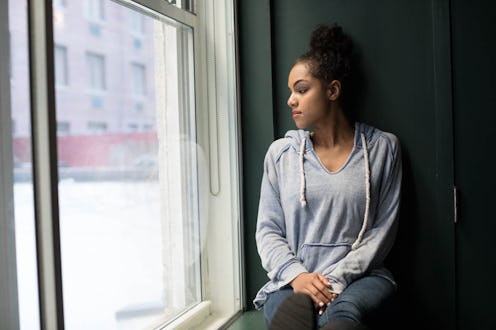Life
7 Signs Of Dependent Personality Disorder

Most of us don't like to be alone, but some people have such a fear of being by themselves that it takes over their life. If someone severley struggles at the thought of being by themselves, they may be exhibiting some signs of Dependent Personality Disorder. This disorder typically presents itself in young adulthood, and it is characterized by a pervasive fear of being alone that it leads to codependent behaviors in the person affected.
"Do you know someone who jumps headfirst into a relationship after another ends? Or hates to be alone? They can't make decisions without their partner's input or is always putting themselves down? These are some of the signs of Dependent Personality Disorder (DPD)," Lauren Keegan, a psychologist at ParentingPod.com, tells Bustle. "In adults, DPD is a condition where someone has a long-lasting and excessive need to be taken care of by someone else — usually by a romantic partner, but it could also be a parent. It typically leads to submissive and clingy behavior and an intense fear of separation."
Some people just enjoy having company, but when it impedes on their life, it is likely something more. Here are seven signs that someone has Dependent Personality Disorder, according to experts.
1Inability To Be Alone
Someone with DPD has an inability to tolerate being alone. They also tend to feel helpless and vulnerable when alone. "A person may struggle when not in a relationship, or they urgently seek another relationship when one ends," Dr. Lindsay Henderson, PsyD, a psychologist who treats patients virtually via telehealth app, LiveHealth Online, tells Bustle. If you or someone you know struggles to be by themselves, it may be best to seek the help of a therapist to combat this fear.
2Difficulty Making Decisions
Someone with DPD will struggle to make choices on their own. "They have difficulty making decisions without input, reassurance, and/or advice from others," says Dr. Henderson. "This applies to the many types of decisions that we make throughout each day."
3Fear Of Conflict
It's also common to fear conflict, disagreeing with others, or disapproval. "A person’s dependence on others may mean that they will avoid jeopardizing this relationship at all costs," says Dr. Henderson. "This may make them vulnerable to maltreatment."
4Reliance On Parents
While still depending on your parents slightly while getting the whole "adulting" thing down is common, take note if you or someone you know takes it to another level. "In adolescence, it is developmentally appropriate to make attempts to increase autonomy and resist a parent’s efforts to regulate their behavior in any way," says Dr. Henderson. "An adolescent who continues to depend on their parents for decisions such as what clothes to wear may be at risk for development of Dependent Personality Disorder traits."
5Difficulty Expressing True Feelings
Because someone with DPD doesn't want to ruin their relationship with others, they often won't be honest about their emotions. "They have difficulties expressing their true feelings for fear of disapproval or a breakdown in the relationship," says Keegan. "For example, agreeing to do things that feel wrong to keep another person satisfied."
6Jumping From One Relationship To The Next
Someone who has difficulties being single may also be struggling with DPD. "A person with DPD jumps from relationship to relationship," clinical psychologist Crystal I. Lee, Psy.D. tells Bustle. "They feel incredibly anxious and upset when they're not in a relationship. Not only do they feel unloved and abandoned, but they also feel lost because they don't have confidence in supporting themselves or making decisions for themselves."
7Preoccupation With Unrealistic Fears
A person with this disorder might be preoccupied with unrealistic fears of being alone and the belief they cannot care for themselves. This fear ultimately interferes with their day-to-day functioning. "This is a critical component of any psychiatric diagnosis," says Dr. Henderson. "It is normal to experience various symptoms of any mental health disorder at any point in our lives in a way that does not interfere with daily life in a substantial way. However, when the symptoms of a psychiatric diagnosis rise to the level of interfering with daily functioning, it becomes more notable and potentially in need of treatment."
If someone exhibits these signs, it's possible they have Dependent Personality Disorder, and can be helped to feel more comfortable being alone by a therapist or loved one.